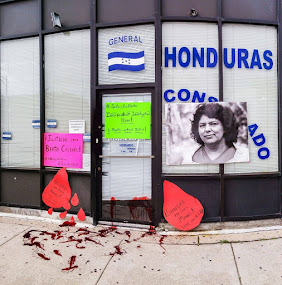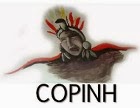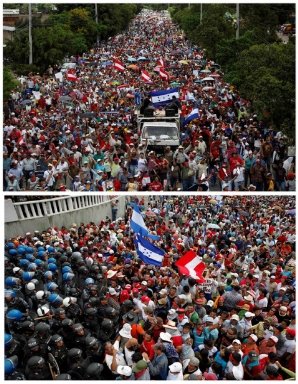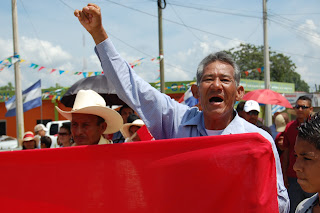Delegation to Honduras - Day I Part I
La Voz de los de Abajo is leading a delegation in Honduras of 9 people from Illinois, Ohio, Arizona, Colorado and Honduras from September 6-16. We will be posting reports as we travel around the country visiting organizations and communities.
We arrived in Honduras on September 6th and amid news of new campesino evictions and detentions and disappearances we drove from San Pedro Sula to Tegucigalpa. In Tegucigalpa we met with the FNRP International Commission’s Gerardo Torres and then with Bertha Oliva the Coordinator of the Committee of the Families of the Disappeared (COFADEH). Later in the afternoon we visited the offices of Via Campesina and met with Rafael Alegrias (Via Campesina, FNRP, LIBRE campesino movement) Yony RIvas (MUCA) Esau Piero (ADCP Progreso) and other members of MUCA and Via Campesina. We will report in more detail on the meetings with the campesinos as part of our reports on visiting the campesino communities in later posts.
Both Bertha and Gerardo talked about the ever worsening human rights, political violence and general violence that have made Honduras the most violent country in the world according to the United Nations. Gerardo cited figures from international reports that show Honduras has 87 violent murders for each 100,000 people which is even more than in Iraq or Pakistan. Bertha made the point that that there is directly political violence and there is general criminal violence but that the criminal violence has to be seen as a product of the general political crises in the country.
LIBRE Party and the National Front of Popular Resistance (FNRP)
Gerardo talked about the process of entering into the electoral struggle with the new political party formed by the resistance movement, LIBRE. He told us that Honduras had a history of being one of the countries most obedient to and dominated by the United States. “After the coup d’e’tat many thousands of people were in the streets every day for months in protest but many people thought that the U.S., the UN , or the Organization of American States (OAS) was going to help them; then they realized that it wasn’t going to happen and that they had to do it themselves. “The FNRP is the biggest organization for social demands in the history of the country; we have resistance groups organized all around the country”.
After almost 2 years of resistance, a debate on whether or not to form an electoral political party took place. At first the decision was made not to form a party. Then negotiations took place in Colombia (brokered by Presidents Chavez and Santos) with Pepe Lobo and President Zelaya that ended with the Cartegena Agreement being signed. This agreement allowed Zelaya and other exiles to return to Honduras and guaranteed the right of the resistance to form a legal political party with the right to participate in elections. The majority of the members of the National Front of Popular Resistance (FNRP) agreed with forming a political electoral movement and keeping the FNRP as a movement of social action and resistance. After fierce debate inside the FNRP the LIBRE Party was formed. This has left a division in the Front with some organizations and individuals deciding not to participate in the electoral party even though they continue to be in resistance and are organizing for social demands (for example indigenous rights). Because the LIBRE Party itself represents a broad movement of resistance it has five formal factions corresponding to differing viewpoints and ideologies within the resistance movement. Right now they are preparing for the primary and internal elections on November 18th in which LIBRE supporters will choose the candidates from the slates offered by the different factions. Then the national elections will take place in November of 2013 There are slates of candidates for local, municipal, provincial and national positions. The internal groupings have each proposed their own slate of candidates for congress, municipalities, etc. but all have united around one candidate for the presidency Xiomara Castro Zelaya, the wife of President Zelaya.
The most recent polls are showing Xiomara with more than 25% of the vote more than any other candidate. Alvarez of the National Party was polled at 18%. This means that if there is no fraud or violence that interferes, LIBRE should win the Presidency in November 2013. Gerardo noted that the government and the oligarchy are selling off everything in the country that they can. More than 30% of the country has been concessioned to mining interests, privatization and privatizing of utilities, pension systems and militarization are taking away everything the people everything they have. Most people in Honduras want a change and “ for the first time in Honduran history there is a left wing party with the possibility of winning” so the oligarchy is unsure of whether they can keep their power in Honduras. There are risks that they won’t allow LIBRE to win. He feels that the Frente is not putting all of its hope in elections, they know that they need to keep the Frente organized as a movement. He ended by asking the international solidarity and human rights organizations to come to Honduras as international observers, “we need people to be here for the elections”.
Berta Oliva - Committe of the Families of the Disappeared (COFADEH)
On September 1, COFADEH always sets up a vigil in front of the Congress Building in Tegucigalpa to commemorate the victims of human rights abuses over the past 30 years after commemorated all the disappeared on August 30 with is International Day for the Disappeared. Our delegation visited the vigil and interviewed families of the disappeared who were participating, then we went to the COFADEH office to talk to Berta Oliva.
“They are hunting down campesinos; the big landowners are powerful enough to be able to get judges to issue orders of eviction for land that they don’t even own. We have a situation where there are death squads, assassins and absolute control of the people but it is a hidden war. Everyone who has been with the resistance has a file and they (the government and the powerful) are taking revenge. For example, at least 7 of the people who stayed with Zelaya while he was in refuge at the Brazilian Embassy have been killed. Now with the elections coming the political elite are so afraid of the LIBRE Party they are killing candidates” (4 candidates have been killed and other LIBRE party activists have also been murdered). The people from LIBRE are getting killed, and it's going to get worse. The increasing violence is a product of the desperation of the two party system… So they're going to have to step up repression even more before the elections so as to terrorize people from voting”. Berta also worries that the oligarchy and repressive apparatus may not allow LIBRE to take office even if somehow fair elections are held.
Berta is raising the alarm as well about a new development in which defenders of human rights such as COFADEH have become the targets of human rights violations. “Compañeras working for COFADEH have been threatened, followed and even had their homes placed under electronic surveillance and broken into”.
One case that COFADEH has been involved in is the case of the indigenous villagers in Ahuas who were killed and wounded in the DEA-Honduran security forces operation in the Mosquitia. “COFADEH and others had to intervene to obtain medical care for the survivors and continue to be involved in obtaining the ongoing medical care needed at the same time as they try to pursue the case in the legal, human rights arena. Bertha expressed outrage at the recent report issued by the Honduran government that claims that the two women victims were not pregnant as their families had reported, “ officials did perform an autopsy and then 40 days after the deaths they exhumed the victims without following proper procedures to protect the chain of evidence and right in the cemetery they opened up the bodies and removed organs which they say proved the women were not pregnant. Witnesses contradict that claim and at any rate there is no proof because there is no evidence now”
.
The situation has become very critical and Bertha emphasized that COFADEH needs international support and help in meeting the challenges that they are facing, “international solidarity needs to prepare to play a role like it did right after the coup. We also need people who can help us take the testimony from victims to make reports on the situation in all the regions that we're not in. Victims of violations are coming to COFADEH but under the current situation they are not just coming to file a complaint and don’t just need some support and legal representation; victims are coming to COFADEH in need of emergency relocation and medical and psychological help as well as representation to pursue a complaint.
“I'm not going to paint you a pretty picture, because it's not pretty. It would be irresponsible of me”
 Last year the resistance's alternative independence day events were brutally attacked by the police leaving many people injured and detained at the police station. Because of that, after discussion with the Permanent Human Rights Observatory in Aguan, our delegation decided to stay in Tocoa to accompany the march. This year the resistance contingent was able to negotiate with the police and there were no serious incidents. at one point a truck decorated with publicity for a local candidate from the National Party (The current president's party) forced its way into the parade in the middle of the resistance contingent and youth ripped off one of the candidate's posters and stomped on it.
Last year the resistance's alternative independence day events were brutally attacked by the police leaving many people injured and detained at the police station. Because of that, after discussion with the Permanent Human Rights Observatory in Aguan, our delegation decided to stay in Tocoa to accompany the march. This year the resistance contingent was able to negotiate with the police and there were no serious incidents. at one point a truck decorated with publicity for a local candidate from the National Party (The current president's party) forced its way into the parade in the middle of the resistance contingent and youth ripped off one of the candidate's posters and stomped on it.


















